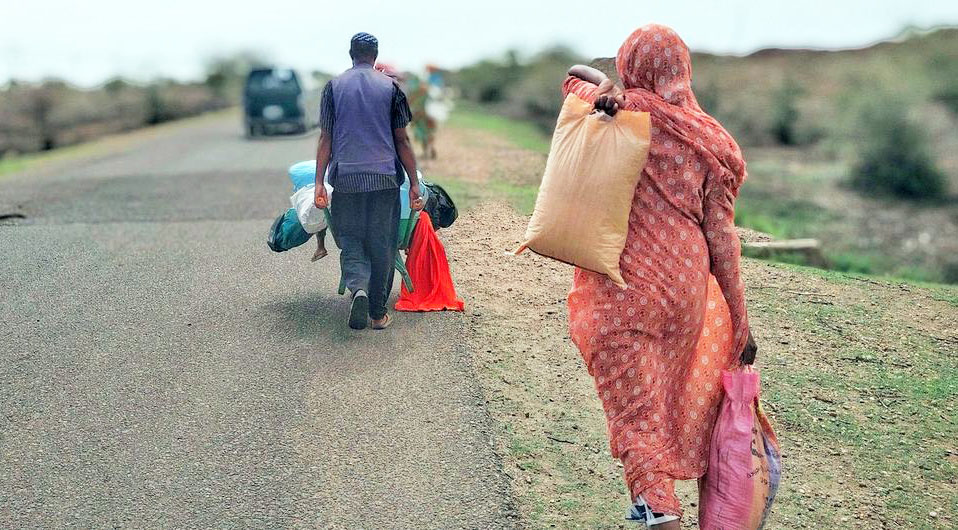
East Nile Holds Its Breath Following Violations in East Gezira
Moatinoon
Residents in the East Nile area of Khartoum are on edge following recent incursions by the Rapid Support Forces (RSF) into East Gezira villages. This escalation follows the defection of an RSF leader who joined the Sudanese army. Residents of villages near Gezira anticipate that the violations inflicted upon civilians in that area might soon extend to their own.
Speaking through WhatsApp, the only remaining Starlink device in her village, "Al-Azza" told “Moatinoon”: "There is a cautious calm in our village and nearby areas. Everyone here is ready to leave if the situation worsens and fighting spreads to our area."
Eyewitnesses told “Moatinoon” that the RSF recently replaced its forces in villages close to the eastern Khartoum-Madani road with unfamiliar troops, raising concern among residents.
Following the defection of Abu Aqla Kikil, the RSF commander in Gezira, and his subsequent joining of the army, East Gezira villages have witnessed intensified operations. Civilian organizations and resistance committees report that extensive violations have led to dozens of civilian deaths amid battles between the Sudanese army, supported by local militia, and the RSF, which has since regained control of Tambul in the Butana region.
Mohammed, a resident of the East Nile area, told “Moatinnon” that RSF troops have begun confiscating Starlink devices from villages, reducing local residents ability to communicate with families elsewhere in Sudan and abroad. He added that residents in these areas suffer from a severe shortage of food and skyrocketing prices, along with a lack of medical services and essential medicines.
The Sudanese Doctors Syndicate’s preparatory committee stated yesterday that healthcare facilities in East Gezira villages have been subjected to brutal attacks. One medical worker was killed in a dialysis center in Rufaa, and three nurses were abducted, their whereabouts still unknown due to network disruptions. In addition, several health workers remain trapped in Tambul Hospital following a drone strike.
The committees statement added, "These violations affected most towns and villages in East Gezira, where militias stormed homes and attacked civilians, leading to widespread displacement. Forces have fired indiscriminately and tortured children to force families into disclosing their assets. Kidnappings for ransom and looting of markets and homes have forced people to flee on foot in search of safety."
West and North Gezira villages have also been affected, enduring an ongoing siege that has led to casualties among residents and prevented the delivery of medical aid. People now face the threat of starvation after losing all resources and must travel by foot due to the lack of transportation.
According to Agence France-Presse (AFP), citing resistance committees, Sarayha and Azraq villages have been under RSF attack since morning, with 50 reported dead and over 200 wounded in Sarayha, while evacuation of the injured is impossible due to ongoing shelling and sniper fire.
As the United Nations Security Council prepares to discuss the situation in Sudan, international organizations have urged the UN and African Union to begin planning a mission to protect civilians in the country. The council is expected to review a report by UN Secretary-General Antonio Guterres, detailing steps member states should take to safeguard Sudanese civilians.
Human Rights Watch (HRW) warned that delaying ceasefire negotiations is no longer an option given the severe deterioration on the ground. HRW highlighted the risks civilians face, including torture, summary executions, and widespread sexual violence against women and girls.
Observers believe the ongoing situation in Sudan and the continued attacks on civilians may prompt the international community to take a stronger stance. In September, the UN Human Rights Councils fact-finding committee on Sudan recommended deploying a civilian protection mission.
UN Agencies
In a joint statement, UN agencies operating in Sudan highlighted the worsening humanitarian crisis, noting the severe limitations on access to essential services as critical infrastructure faces collapse. They called for intensified global efforts to meet the overwhelming needs.
The UN agencies stressed the urgent need to protect civilians and appealed to all parties in the conflict to respect international humanitarian law and prioritize civilian safety, especially as civilians — particularly women and children — endure grave rights violations, including sexual and gender-based violence, exploitation, and attacks on their safety and dignity.
They demanded an immediate halt to such actions, including the use of sexual violence as a weapon of war. "Humanitarian aid alone cannot solve this crisis; we must also ensure the protection of vulnerable populations from further harm. The people of Sudan need our collective action now, and we must respond with the urgency and scale that this crisis requires."

